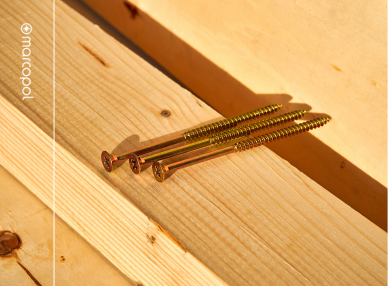
Wood screws – selecting length and thread type
Wood screws are a fundamental fastener in woodworking, carpentry, and renovation/construction. Choosing correctly—both the length and the thread type—is crucial for durability and safety. This article explains how to select screws appropriately, taking the wood species and use case into account.
Types of wood screws
Understanding the differences between screw types is essential. There are full-thread and partial-thread screws.
- Full thread provides holding power along the entire shank—especially beneficial in softwoods.
- Partial thread is preferred when joining a thinner member to a thicker one; the unthreaded shank helps draw parts tightly together.
Structural/wood-construction screws (often used by carpenters) deliver high strength and are available with anti-corrosion coatings for outdoor exposure. The steel grade matters too—use stainless steel in damp or corrosive environments. Selecting the right screws, including heavy-duty structural types, is the foundation of a safe, long-lasting timber assembly.
Countersunk vs. hex head
Head style also matters:
- Countersunk (CSK) head sits flush with the surface, creating a smooth finish—ideal for precise joinery and furniture where appearance is important.
- Hex head (common for structural applications) enables very strong joints and resists pull-out; the larger bearing area enhances stability.
Choose the head style that best suits the job—balancing aesthetics and structural needs. The screw length combined with the head style strongly influences joint durability and safety.
Full thread vs. partial thread
The right thread configuration is key to connection performance:
- Full-thread screws are ideal for thinner members when maximum, evenly distributed grip is needed.
- Partial-thread screws excel when one component is markedly thicker, creating a tight, stable, force-locked joint.
In heavy-duty assemblies, full-thread structural screws are often preferred. Match thread pitch to the wood: coarser threads for hardwoods (bite and drive), finer threads for softwoods (reduce tear-out and improve holding). Regardless of type, material quality and precise installation determine long-term safety.
How to choose screw length for the wood
Match length to the combined thickness of members and the wood species.
- In softwood, opt for longer screws to ensure deep embedment and prevent pull-out under load.
- In hardwood, slightly shorter screws can suffice thanks to higher base-material resistance.
Also consider screw type—self-drilling, structural, or stainless—especially for outdoor builds. Correct length is pivotal for safety and service life, enabling stable, neat joints. Pilot drilling with appropriate bits is recommended to ease driving and minimize splitting.
Driving and installation techniques
Proper installation is as important as choosing the right screw:
- Pilot holes in hardwood make driving easier and prevent splitting. The bit diameter should be slightly smaller than the screw’s core diameter for optimal thread engagement.
- Match the bit/driver to the head style and set an appropriate clutch/torque to avoid over-driving or damaging the wood.
- Drive perpendicular to the surface for even load distribution and to reduce bending risk.
- For long screws, drive in stages with steady pressure to reduce breakage risk.
The combination of correct length and sound technique yields durable, safe joints.
Common mistakes & practical tips
Frequent errors include:
- Wrong length—too short means poor holding; too long may protrude and pose a safety hazard.
- Mismatch to wood—hardwoods call for stronger/harder screws; softwoods often benefit from finer threads.
- Skipping pilot holes in hardwood or angling screws during driving—both weaken the joint.
To avoid issues: match screws to wood type and member thickness, use the correct bit, set proper torque, and drive square to the surface. High-quality screws, including stainless structural screws, help ensure durable, safe assemblies.
Marcopol wood screws – a confident choice
Marcopol offers high-quality wood screws known for precise manufacturing, durable materials, and carefully tuned technical parameters, delivering stable, reliable joints. With a broad range of thread forms and head styles for both softwood and hardwood, you can count on durable, neat, and safe timber assemblies—plus expert support in selecting the right components.
- Merry Christmas and a Happy New Year - 22 December 2025
- Façade screws. Which screws to choose for a building façade? - 19 December 2025
- Company christmas eve at the new hardening plant - 19 December 2025